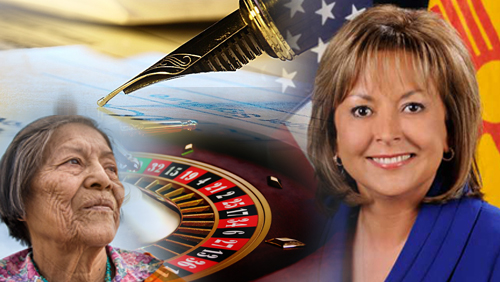New Mexico moved one step closer to finalizing a new gaming compact between the state and Native American tribes after Governor Susana Martinez signed a bill that will allow tribal casinos to remain in operation for another 22 years. The compact was approved last month by the Legislature and now all that remains is an approval from the U.S. Department of Interior before the compact takes effect.
moved one step closer to finalizing a new gaming compact between the state and Native American tribes after Governor Susana Martinez signed a bill that will allow tribal casinos to remain in operation for another 22 years. The compact was approved last month by the Legislature and now all that remains is an approval from the U.S. Department of Interior before the compact takes effect.
Martinez’s approval of the new gaming compact is a culmination of three years of negotiations between the state and Native American leaders.
Under the terms of the compact, Native American tribes will provide regular reports to the state about their gaming activities. Native American tribes have also agreed to increase the state’s share of revenue and to direct a percentage of gaming revenue to help address potential problem gambling issues. Finally, tribal casinos will now be part of a self-exclusion program, a new provision that previously was used only at private racetracks.
“In exchange for the significant benefits they receive in this compact, the tribes have agreed to increase the revenue sharing amounts they pay to the State,” reads a statement from Martinez’s office. “The compact also better addresses problem gambling issues by putting a percentage of gaming revenue toward treatment services, providing new transparency on how those funds are being used, and including tribal casinos, for the first time, in a state-wide self-exclusion program for problem gamblers that only private race tracks had participated in up until now.”
The five Native American tribes – the Pueblo of Acoma, the Pueblo of Jemez, the Jicarilla Apache Nation, the Mescalero Apache Tribe and the Navajo Nation – who were part of the negotiations have also signed the compact.
Had Martinez not signed, these tribal casinos would have been forced to close when the current compact expires on June 30, 2015. Other tribes with casinos in New Mexico are also expected to sign the new compact; something Gov. Martinez said would “preserve the stability and predictability of gaming in New Mexico.”